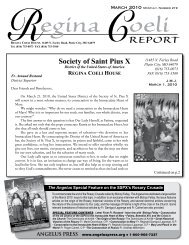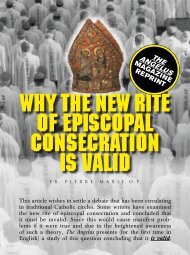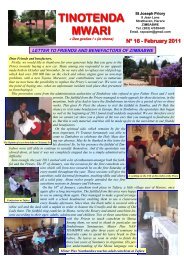Is Feeneyism Catholic? - Society of St. Pius X
Is Feeneyism Catholic? - Society of St. Pius X
Is Feeneyism Catholic? - Society of St. Pius X
Create successful ePaper yourself
Turn your PDF publications into a flip-book with our unique Google optimized e-Paper software.
94 IS F EENEYISM C ATHOLIC?<br />
Now a sacrament may belong to the Divine worship in three<br />
ways: first in regard to the thing done; secondly, in regard to the<br />
agent; thirdly, in regard to the recipient. In regard to the thing<br />
done, the Eucharist belongs to the Divine worship, for the Divine<br />
worship consists principally therein, so far as it is the sacrifice<br />
<strong>of</strong> the Church. And by this same sacrament a character is not<br />
imprinted on man; because it does not ordain man to any further<br />
sacramental action or benefit received, since rather is it “the<br />
end and consummation <strong>of</strong> all the sacraments,” as Dionysius says<br />
(Eccl. Hier. iii). But it contains within itself Christ, in Whom<br />
there is not the character, but the very plenitude <strong>of</strong> the Priesthood.<br />
But it is the sacrament <strong>of</strong> order that pertains to the sacramental<br />
agents: for it is by this sacrament that men are deputed to<br />
confer sacraments on others: while the sacrament <strong>of</strong> Baptism<br />
pertains to the recipients, since it confers on man the power to<br />
receive the other sacraments <strong>of</strong> the Church; whence it is called<br />
the “door <strong>of</strong> the sacraments.” In a way Confirmation also is ordained<br />
for the same purpose, as we shall explain in its proper<br />
place. Consequently, these three sacraments imprint a character,<br />
namely, Baptism, Confirmation, and Order (ST, III, Q.63,<br />
A.6).<br />
There is a spiritual danger in Fr. Feeney’s over-insistence on<br />
the character <strong>of</strong> baptism. This character is indelible, we cannot<br />
make it grow. So this over-insistence can lead to spiritual apathy:<br />
well, I have my seal, I have fulfilled the requirements for salvation,<br />
I do not have to worry any more! On the contrary, the Church<br />
teaches that sanctifying grace can grow, and it can be lost, too:<br />
“Forgetting the things that are behind and stretching forth myself<br />
to those that are before, I press towards the mark, to the prize <strong>of</strong><br />
the supernal vocation <strong>of</strong> God in Christ Jesus” (Phil. 3:13, 14).<br />
This is proper <strong>Catholic</strong> spirituality, not based on a false security <strong>of</strong><br />
an indelible character, but on the dynamic <strong>of</strong> a participation <strong>of</strong><br />
the divine life <strong>of</strong> Christ in us!<br />
Desiring to insist on the necessity <strong>of</strong> the (exterior sign <strong>of</strong> the)<br />
sacrament <strong>of</strong> baptism, Fr. Feeney and his disciples have practically<br />
bestowed upon the character <strong>of</strong> baptism what the popes, Doctors,<br />
and all the <strong>Catholic</strong> theologians say <strong>of</strong> the grace <strong>of</strong> baptism (in the<br />
strict sense), which grace is received by those who have “baptism











